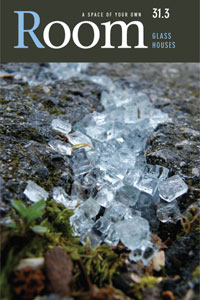Glass Houses | 31.3
2008
Digital only; out of stock in print.
The old adage that people who live in glass houses shouldn’t throw stones is fairly sound advice, but it’s hard to follow. I don’t know about you, but I’ve thrown my fair share of sharp pebbles—sometimes out of jealousy, sometimes out of anger, but almost always from a place rooted in fear and loneliness. This is the first time I’ve edited an issue of Room, and I wasn’t sure what to expect.
I’m relatively new to the collective, and I wasn’t sure how I would carve out a theme from the hundreds of submissions we get. But, as I kept reading, I found myself drawn to the stories and poems where judgments, right or wrong, seemed to be the beating heart that unified each piece.
Ultimately, I decided to call this issue Glass Houses. The theme sort of reached up its arms to me as each piece became a commentary on the critical nature of our society. The majority of pieces I’ve chosen tend to explore how judgment is really just the result of the ways in which we add up our lonely moments.
Susan Musgrave plays so beautifully with words, it takes a moment for the gravitas of her images to sink beneath the skin, particularly as she talks about the concept of home in “All the Wild Winds of the World Go Howling Through You.”
Krista Foss explores similar territory in “The Hammock” where a mother slowly unravels with the realization that she is an outsider to the small family that is her husband and teenage daughter. Cara-Lyn Morgan’s poem “Reading this list of names, I find myself” begs for sustainability to an ancestry in danger of slipping into oblivion. Jacklyn Lewis’s art series, Jackson Island, borrows its inspiration from Huckleberry Finn, bringing to life innocence and alienation.
Sarah Richardson’s “Confessions of a Dental Assistant” opens our eyes to the sink or swim feelings of monotony and depression. Rainey Reitman’s opening sentence in “A heavy thing” chills, intrigues, takes hold and refuses to let go.
Jesse Gray’s striking cover image, “No Fault,” takes things found broken and creates a new story, freeing the objects from their past. Phoebe Tsang, a creative writing student at UBC, uses a keen eye and stories from her past to capture passion and childhood in “Butterfly Nights.” Katherine Cameron’s short poem speaks to an end and a beginning in “September Blues” while Adrienne T. Kitchin tackles the potential loneliness of hesitant love in “Woman in Garden.” Anne Lavesque’s essay “Reason Over Passion” touches on the frustrating experience of immigration and growing up, a topic Angela Dorsey’s flash fiction “Consumed” also visits as her protagonist becomes a teenager.
It’s perhaps fitting that the darkest pieces in this anthology also contain some of the most beautifully disturbing imagery. Anna Warje’s “Child’s Garden” revels in juxtapositions of nature and sexuality. Valerie Mills-Milde’s “Nothing Personal” reveals a woman self-destructing in a dangerous relationship. Terri Vlassopoulous’s unusual and inventive story “Baby Teeth” tasks us with imagining the animal that lives inside everyone.
All of these pieces got me thinking about what motivates writers, as people, to craft stories that perhaps lay our own secret judgments down on the paper for all to see. If not our own judgments, what have we witnessed or internalized that penetrates so thoroughly we find ourselves devoting stanzas to lovers we can’t understand? Piling sentences into paragraphs about people who may have looked us up and down with envy or disgust or love and etched a story into our consciousness that begged to be written down.
It’s probably true that as women we are our own worst critics. Often our expectations of ourselves far exceed those other people have of us. But sometimes we cannot face our own disappointment, failures, or loneliness; that is usually when judgment adopts its ugliest face. Are we just terrified that if we weren’t casting our disdain like a fishing line, we’d just be left empty?
In these writers’ hands, judgment morphs our deepest fears into compelling stories that heal, wound, haunt, transfix, and transform us from the inside out, making our own Glass Houses a little less fragile when we recognize ourselves in the faces of other women.

$10.00
Additional information
| Delivery | Canada, USA, International, Digital |
|---|
In this issue: Marianne Apostolides, Katherine Cameron, Angela Dorsey, Krista Foss, Jesse Gray, Adrienne T. Kitchin, Shelley Kozlowski, Anne Lévesque, Jaclyn Lewis, Valerie Mills-Milde, Cara-Lyn Morgan, Susan Musgrave, Rainey Reitman, Sarah Richards, Phoebe Tsang, Teri Vlassopoulos, Anna Wärje